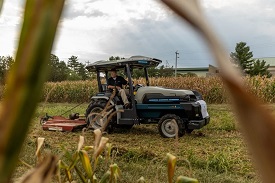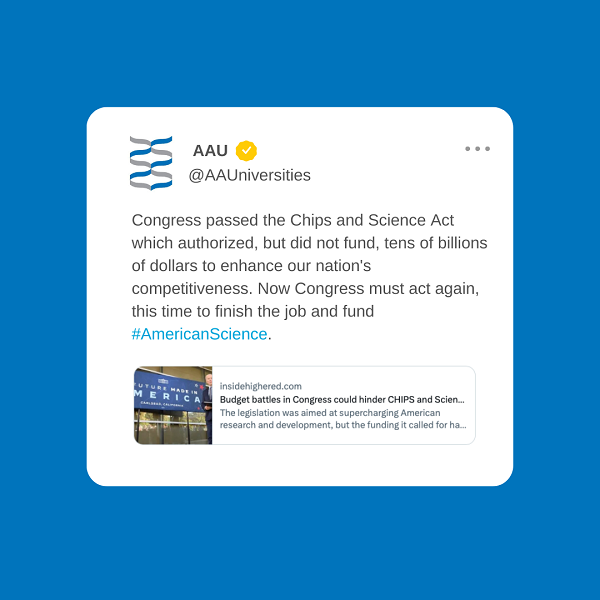 Congressional Budget Wrangling Endangers Science Funding
Congressional Budget Wrangling Endangers Science Funding
As members of Congress return to Capitol Hill from the August work period, they must act by September 30 to avoid a potential government shutdown. Senate Majority Leader Chuck Schumer (D-NY) is bringing a package of three spending bills to the Senate floor this week, but the path to passing the remaining measures, in both the Senate and the House, is murky.
While leaders in both chambers agree that a continuing resolution (CR) will be necessary to keep the government running past the end of the current fiscal year on September 30, they do not yet have a consensus as to whether the resolution would simply continue current FY23 spending levels or include additional policy provisions and supplemental funding. There is also no agreement as to the duration of the CR.
In the event of a shutdown, most government activities, including those of federal science agencies, will come to a halt. As AAU has noted in previous letters to Congress, shutdowns and continuing resolutions slow the pace of scientific innovation and create funding uncertainties for researchers and students. Delays in final appropriations force federal agencies to postpone research award decisions and create unnecessary and costly administrative backlogs.
Given the current budget impasse, as well as provisions in the debt limit suspension law passed earlier this year setting caps on federal spending levels, it is also unlikely that Congress will meet the funding targets for federal science agencies included in the CHIPS and Science Act of 2022. As Inside Higher Ed reported last month, science advocates worry that Congress has forgotten about the “science” portion of the bill, which authorized but did not fund “$200 billion in spending over 10 years” for federal science agencies to support domestic research, education, and innovation.
“We think it’s critical that Congress gets the message to fund American science to keep our economy robust, keep our national security strong and keep our nation healthy,” AAU President Barbara R. Snyder told Inside Higher Ed. “We just think that the investment that was called for in CHIPS and Science is essential even in times when budgets are tight. In some ways, that’s the time when it’s the most important, because the results that they produce multiply many times and really can make an enormous difference.”
 AAU Staff Participates in Workshop on Enacting a National Agenda for Undergraduate STEM Education
AAU Staff Participates in Workshop on Enacting a National Agenda for Undergraduate STEM Education
Earlier this summer, AAU participated in a workshop focused on finding scalable ways to improve undergraduate STEM education nationwide. AAU Deputy Vice President for Institutional Policy Emily Miller collaborated with University of Colorado Boulder Professor of Physics Noah Finkelstein and Stanford University Center for Teaching and Learning Director Cassandra Volpe Horii to facilitate the event, “Levers for Change 2023: Enacting a National Agenda for Undergraduate STEM Education.”
Hosted by the American Association for the Advancement of Science and funded by the National Science Foundation, the workshop gathered national leaders from across higher education, including AAU member campuses, to discuss evidence-based practices to foster equity, inclusion, innovation, and scientific excellence in undergraduate STEM education. The workshop built upon the efforts of the 2019 Levers for Change: An Assessment of Progress on Changing STEM Instruction project.
AAAS is currently working on a report documenting the actionable agenda resulting from the workshop. The recommendations will also be incorporated by the STEMM Opportunity Alliance to construct a national strategy for achieving equity goals in STEM.
 FEATURED RESOURCE: AAU’s Undergraduate STEM Education Initiative
FEATURED RESOURCE: AAU’s Undergraduate STEM Education Initiative
AAU’s Teaching Evaluation Project
UCLA Chancellor, Yale President Announce Departure; Ohio State Selects New President
Last month, the University of California, Los Angeles announced that Chancellor Gene Block is stepping down after 17 years of leadership. Block began his tenure in August 2007, and his final day in office will be July 31, 2024. A renowned neurobiologist, he will return to UCLA as a faculty member next year. Yale University President Peter Salovey also announced last month that he will step down as president, but return to Yale as a full-time faculty member at the end of the 2023-24 academic year. Salovey assumed Yale’s presidency in 2013.
Meanwhile, The Ohio State University Board of Trustees announced last month that University of Nebraska System President Walter “Ted” Carter Jr. will serve as Ohio State’s next president. Carter will begin his tenure on January 1, 2024.
White House Releases Memo Outlining R&D Priorities for FY25
Last month, the Office of Management and Budget and the White House Office of Science and Technology Policy released a memorandum outlining the Biden administration’s multi-agency research and development priorities for formulating FY25 budget submissions to the OMB. The memo instructs agencies to prioritize areas such as artificial intelligence, national security, the climate crisis, and public health.
Among other things, the memo asks agencies to “experiment with funding processes to better achieve agency R&D missions” and to “support the infrastructure and capacity for providing free, immediate, and equitable public access to federally-funded research results.” It also asks agencies to bolster innovation to “build the nation’s future economic competitiveness” and to identify and address research security challenges.
 New Report Shows F-1 Student Visa Denials Have Grown Significantly Since 2015
New Report Shows F-1 Student Visa Denials Have Grown Significantly Since 2015
A new report from the Presidents’ Alliance on Higher Education and Immigration and Shorelight finds that “visa denials to study in the U.S. grew significantly from 2015-2022, especially for Global South countries.”
The report notes that denials for students seeking an F-1 visa to study in the United States grew across the world “with the exception of Australia, China, Brazil, South Africa and some European countries.” The report finds that visa denials for students from South America more than doubled from 2015 (10%) to 2022 (24%), and that denial rates for African countries were the highest during the period studied. According to the report, “The visa denial rates for central, eastern, western, and northern Africa ranged between 48% and 71%” in 2022.” The report argues that the United States is “losing out on qualified future talent from Africa” due to visa denials even as “other nations are competing to attract this talented pool of students.”
News of Interest
KXAN Austin: Samsung Announces $3.7 Million Commitment to UT for ‘Semiconductor Ecosystem’ – The University of Texas at Austin announced last week that Samsung Austin Semiconductor is investing $3.7 million in the university’s Cockrell School of Engineering to enhance semiconductor workforce development and research. According to the university, the investment will “elevate UT’s semiconductor education, innovation and research and position the state as a leader in the burgeoning U.S. semiconductor industry.”
Inside Higher Ed: Measuring Higher Ed’s Benefits Beyond Earnings – A new report from the Lumina Foundation and Gallup shows that, beyond employment and earnings, “a postsecondary degree can improve outcomes in everything from personal health and character to civic engagement and relationships.” According to the report, individuals with more education have better health, higher rates of civic participation, and increased life satisfaction.
KUER: University of Utah and SLCC Tie the Knot on a New Joint Campus in Herriman – The University of Utah and Salt Lake Community College recently opened a shared campus where students can seamlessly transfer from earning an associate’s degree from SLCC to earning a bachelor's degree from Utah. University leaders hope that the shared campus will “increase access to higher education, both financially and geographically.”
AP News: US Universities Launch Partnership to Elevate Free Speech to Counter Threats to Democracy – Presidents from 13 universities, including five AAU members, have come together to create the Campus Call for Free Expression, a nonprofit initiative to cultivate freedom of speech on campuses and to confront threats to democracy. The initiative will look different on each campus and will support programs focused on helping “students work together to find solutions to complicated, divisive problems.”
Metro Atlanta CEO: Georgia Tech Powers State Economy with $4.5 Billion Impact – A new study shows that the Georgia Institute of Technology contributed more than $4.5 billion to the Georgia economy in FY22. According to Georgia Tech President Ángel Cabrera, the report “underscores the value” of the state’s higher education system.
Los Angeles Times: UC Admits Record Number of California First-Year Students for Fall 2023, Led by Latinos – The University of California system enrolled 88,285 Californians in fall 2023, an increase of 3.5% from last year. Latinos constitute the largest group of California students admitted, at 38% of the total. Campuses “also increased admission offers to transfer students.” Out of the admitted Californians, 45% are first-generation students and 47% are low-income. Eight out of the nine UC campuses are AAU members.
The San Diego Union-Tribune: As UC San Diego Chancellor, Here’s How I’ll Make Student Housing Affordable and Accessible – In an opinion essay, University of California San Diego Chancellor Pradeep Khosla discusses how the university is expanding access to higher education by increasing accessible and affordable on-campus housing for students. Housing is central to “enhancing the student experience, expanding access to a top-quality UC education and lowering costs,” Khosla writes, adding: “We will continue to lead from the front to meet this ambitious goal.”
Featured Research

First Autonomous Tractor Arrives at MU
Researchers at the University of Missouri recently welcomed “one of the nation’s first-of-its-kind electric, autonomous tractors.” The tractor will serve as a teaching and research tool in the school’s engineering and agriculture programs; researchers will also study the tractor to determine how it could “refine agricultural practices and support farmers with disabilities.”

During Pandemic, Proponents of ‘Doing Your Own Research’ Believed More COVID Disinformation
A new study published by University of Wisconsin-Madison researchers shows that “people who were more supportive of the phrase ‘doing your own research’ were more likely to be distrustful of scientists and more likely to believe misinformation about COVID-19.” According to the researchers, “doing your own research” messages promoted skepticism of scientific institutions and were more “an expression of an anti-establishment world view than an interest in finding more or better evidence.”
Upcoming Events

The Golden Goose Award will host its annual award ceremony and reception at the Coolidge Auditorium at the Library of Congress on Wednesday, September 27, from 5:30 – 8: 30 p.m. ET.
The award honors federally funded scientific research that may sound frivolous or silly but has resulted in tremendous societal impact. AAU is one of the award’s founding organizations and continues to work with the American Association for the Advancement of Science to support the award’s annual activities. Register for the ceremony here by September 25!
From Our Feeds
Congress passed the CHIPS and Science Act last year but has fallen short of its promise to provide more funds to the nation’s scientific research enterprise. As AAU President Barbara R. Snyder told Inside Higher Ed, “I think the American people want and expect us to be the world leader in innovation. I think they want us to lead the world in science, and I think we want to keep doing that. But that does not come without investment.”
